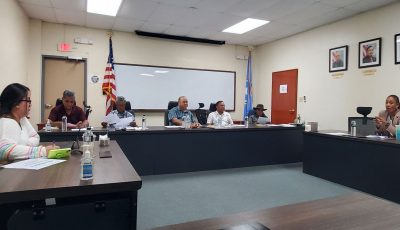Seven former IPI workers seek $11.58M in damages
China-based plaintiffs also demand attorneys’ fees, court costs
The seven China-based former workers of a then-contractor and a subcontractor of Imperial Pacific International (CNMI) LLC are seeking a total of $11.58 million in compensatory damages against IPI in connection with their lawsuit. They also want payment for attorneys’ fees and court costs.
That’s $3,863,534 in compensatory damages plus $7.72 million punitive damages, for a grand total of $11.58 million.
Aaron Halegua and Bruce Berline, who are counsel for the plaintiffs, said this amount is reasonable for the “slave-like” conditions and severe injuries the plaintiffs endured. The two said attorneys’ fees and costs are available to the plaintiff under the Trafficking Victims Protection Re-Authorization Act when a default judgment is entered. Therefore, the lawyers said they request that a briefing schedule be set at the Aug. 7 hearing concerning an award of fees and costs.
Last June 12, U.S. District Court for the NMI Chief Judge Ramona V. Manglona entered a default judgment against IPI during a show-cause hearing, describing IPI’s noncompliance with court orders and delays in this lawsuit as “mindboggling and “very frustrating.”
IPI general counsel Michael Dotts earlier stated that they disagree with Manglona and that they will move to reconsider her decision.
The plaintiffs filed Thursday their petition for damages. The plaintiffs—Tianming Wang, Dong Han, Yongjun Meng, Liangcai Sun, Youli Wang, Quingchun Xu, and Xiyang Du—are suing IPI, MCC International Saipan Ltd. Co. and MCC’s subcontractor Gold Mantis Construction Decoration (CNMI) LLC over the alleged injuries they suffered during accidents at the worksite of IPI’s casino project in Garapan.
In their petition for damages Thursday, Halegua and Berline said that Tianming Wang suffered burnt leg, Han had a crushed finger, Sun had a severed finger, Meng had burnt hand and leg, Xu had an inverted ankle, Youli Wang had a fractured finger, and Du had a crushed finger. The plaintiffs are seeking compensatory damages for emotional distress, lost income, future lost income, and pain and suffering.
Tianming Wang is seeking $1,025,057 in total compensatory damages; Han $565,203; Sun $474,244 (excluding future lost income as not available); Meng $416,450 (excluding future lost income as not available); Xu $460,467; Youli Wang $492,946; and Du $429,167 (excluding future lost income as not available).
Halegua and Berline said the plaintiffs were defrauded into paying enormous fees for work on Saipan, indebting themselves to family, friends, or loan sharks, only to spend each day in fear of being beaten, fired, fined, or deported; that the plaintiffs were treated like “machines,” not human, working 13-hour days for less than minimum wage without a day off in up to five months.
“It was the most dangerous worksite that plaintiffs had ever seen—tired workers performing evening shifts high-up on the casino scaffolding with no safety nets,” Halegua and Berline said.
Plaintiffs were allegedly humiliated by bosses who called them heigong (“illegal workers”) and ridiculed for being “stupid” because they paid a recruitment fee for their job. Halegua and Berline said one manager allegedly poured a cheap Chinese liquor on Youli Wang’s wound. Sun allegedly had to rely on his cell phone’s translation app to try to buy medicine for his severed finger at a local pharmacy. Wang allegedly paid his own taxi fare to get back to the dorm after his leg was incinerated. Halegua and Berline said the impact of this conduct by IPI and its contractors on plaintiffs’ lives has been ruinous. They said most plaintiffs remain in debt years after returning from Saipan. They said one lives with his sister, away from his son and mother, because he fears the loan sharks in his hometown. Wang has allegedly been unable to work in three years since his leg was engulfed by flames. Every day, Wang allegedly endures the shame and embarrassment of wanting to support his parents, but instead watching his 51-year-old father endure backbreaking work to support him and his daughter.
Han allegedly accepts money from his elderly father’s pension.
The lawyers said IPI not only condoned this inhumane treatment, but actively participated in and benefitted from the forced labor scheme. They noted that when Occupational Safety and Health Administration discovered that 80 workers were seriously injured in a single year, IPI still denied the inspector access to the site.
Halegua and Berline said IPI took no action upon seeing unpaid workers protest or being told that workers on tourist visas were building its casino.
Instead, IPI allegedly praised MCC for doing a great job while it earned billions of U.S. dollars in revenue.
The lawyers said three plaintiffs worked for MCC and then later worked for Gold Mantis; the remaining four only worked for Gold Mantis.
Halegua and Berline said MCC and Gold Mantis were aware of the plaintiffs’ debts, but each still charged them an additional fee after they arrived on Saipan in order to start working.
The lawyers said the forced labor scheme only came to an end after a tourist worker fell to his death on the construction site in March 2017, prompting a Federal Bureau of Investigation raid of IPI’s contractor.
The lawyers said Gold Mantis managers fled Saipan, leaving plaintiffs unpaid in decrepit housing without food and water. “Only then were plaintiffs finally taken to the hospital on Saipan,” they said.
IPI, MCC, and Gold Mantis have denied the plaintiffs’ allegations.



























